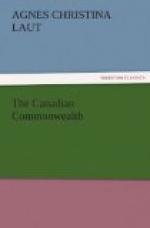She was not settled by land-seekers. Neither was she peopled by adventurers seeking gold. The first settlers on the banks of the St. Lawrence came to plant the Cross and propagate the Faith. True, they found they could support their missions and extend the Faith by the fur trade; and their gay adventurers of the fur trade threaded every river and lake from the St. Lawrence to the Columbia; but, primarily, the lure that led the French to the St. Lawrence was the lure of a religious ideal. So of Ontario and the English provinces. Ontario was first peopled by United Empire Loyalists, who refused to give up their loyalty to the Crown and left New England and the South, abandoning all earthly possessions to begin life anew in the backwoods of the Great Lakes country. The French came pursuing an ideal of religion. The English came pursuing an ideal of government. We may smile at the excesses of both devotees—French nuns, who swooned in religious ecstasy; old English aristocrats, who referred to democracy as “the black rot plague of the age”; but the fact remains—these colonists came in unselfish pursuit of ideals; and they gave of their blood and their brawn and all earthly possessions for those ideals; and it is of such stuff that the spirit of dauntless nationhood is made. Men who build temples of their lives for ideals do not cement national mortar with graft. They build with integrity for eternity, not time. Their consciousness of an ideal gives them a poise, a concentration, a stability, a steadiness of purpose, unknown to mad chasers after wealth. Obstinate, dogged, perhaps tinged with the self-superior spirit of “I am holier than thou”—they may be; but men who forsake all for an ideal and pursue it consistently for a century and a half develop a stamina that enters into the very blood of their race. It is a common saying even to this day that Quebec is more Catholic than the Pope, and Ontario more ultra-English than England; and when the Canadian is twitted with being “colonial” and “crude,” his prompt and almost proud answer is that he “goes in more for athletics than esthetics.” “One makes men. The other may make sissies.”
With this germ spirit as the very beginning of national consciousness in Canada, one begins to understand the grim, rough, dogged determination that became part of the race. Canada was never intoxicated with that madness for Bigness that seemed to sweep over the modern world. What cared she whether her population stood still or not, whether she developed fast or slow, provided she kept the Faith and preserved her national integrity? Flimsy culture had no place in her schools or her social life. A solid basis of the three R’s—then educational frills if you like; but the solid basis first. Worship of wealth and envy of material success have almost no part in Canadian life; for the simple reason that wealth and success are not the ideals of the nation. Laurier, who is a poor man, and Borden,




